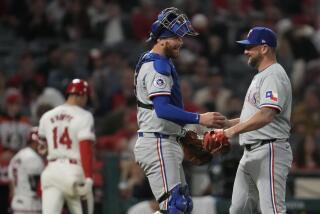Minor Mistakes Are Costly as Angels Lose to Rangers
ARLINGTON, Tex. — Three weeks ago, they were minding their own business at various levels of the Angels’ minor league system--Terry Clark at triple-A Edmonton, Bobby Rose and John Orton at double-A Midland, Tex.
Saturday night, all three were on the field at Arlington Stadium, presented with the heady assignment of helping the Angels reclaim a share of first place in the American League West.
A managerial roll of the dice by Doug Rader?
An indictment on the current state of Angel depth?
Blind faith?
Under any label, they weren’t the answer in the Angels’ 3-2 loss to the Texas Rangers before a crowd of 32,157, exposing all the nerves that customarily come with the mix of inexperience and extraordinary circumstances.
Clark, pitching in place of injured Chuck Finley, yielded a triple to the first batter he faced, a run in the first inning he pitched and left after 4 2/3 innings, trailing, 3-1.
Rose, starting at third base because Jack Howell has a batting average of .048 against Texas’ Charlie Hough, dropped a pop fly to trigger a two-run fifth inning for Texas and bounced into a rally-killing double play in the sixth.
Orton, behind the plate because catchers Lance Parrish (back) and Bill Schroeder (elbow) are both ailing, gave up a run by failing to hold a third strike and, two innings later, firing a ball to second base with no one covering and no one attempting to steal.
Then, as a clinching aside, Rader was left with a bench so depleted that he was unable to pinch-run for Johnny Ray, who was representing the tying run at second base in the eighth inning.
When Brian Downing followed with a sharp single to right field, Ray, hardly a sprinter, was waved home against Texas right fielder Ruben Sierra, who has one of the strongest arms in the major leagues. The result, predictably, was no contest.
Ray was easily out at home and the Angels had squandered the only scoring opportunity they would get against Ranger bullpen stopper Jeff Russell, who tied a club record with his 29th save.
In the process, they also squandered a chance to tie Oakland again atop the standings. The Athletics lost to Kansas City, 2-0, and remain a game ahead of the Angels.
For one night, anyway, it was too much youth too soon for the Angels.
‘You really don’t expect (mistakes), but you sure can excuse it,” Rader said, referring to his club’s minor league connection. “It certainly is forgivable . . .
“But, you really can’t blame this one on the kids. It was a 3-2 game. We’re playing in a ballpark favorable to offense. We should’ve generated more offense than that.
“We could’ve just as easily gotten the kids off the hook.”
Still, the Angels’ predicament Saturday was undoubtedly complicated by their youth.
Clark, two days removed from Edmonton, found himself in immediate trouble after Texas’ leadoff hitter, Cecil Espy, tripled over the head of left fielder Chili Davis.
Espy scored on a sacrifice fly by Jack Daugherty.
Then, with the score 1-1 in the fifth, Clark staggered through the kind of inning a pitcher hopes to confine to his nightmares.
Batter No. 1, Jeff Kunkel, hit a routine infield pop up to Rose--and Rose dropped it for a two-base error.
After a sacrifice bunt moved Kunkel to third, the runner scored on Clark’s wild pitch.
Espy then hit a single to center.
He advanced to second on Clark’s balk.
One out later, Espy was on third when Clark apparently struck out Rafael Palmeiro to end the inning. But the ball skipped past Orton for a wild pitch, enabling Palmeiro to reach first base and Espy to score what proved to be the winning run.
“I should’ve had that one,” Orton said. “It hit my arm. I was anticipating (the ball) in the dirt. I know that pitch breaks down. I got low for it. I just didn’t catch it.”
A more glaring--but ultimately innocuous--mistake awaited Orton in the seventh inning, with Espy leading off first base and Palmeiro at bat. As reliever Willie Fraser pitched, Espy faked a break for second base, pulling up after two steps and holding at first.
Orton failed to hold the ball, however. The rookie pumped a throw down to second base, which beat Espy by about 80 feet. But with no Angel covering, the ball bounded into center field, enabling Espy to advance to second.
Because he stayed there, with Fraser working out of the jam, the Angels were able to laugh about it later. “Everybody in the dugout was telling me, ‘Nice throw--at least it was over the bag,’ ” Orton said. ‘I didn’t see (Espy) hold up. I saw him take off and I must’ve had tunnel vision. It was a little embarrassing.”
But, embarrassment and all, the Angels still had a chance to tie in the eighth inning--at least until Ray and Angel third base coach Moose Stubing tried to test Sierra’s throwing arm, which, by now, doesn’t need such testing.
“Sierra’s as talented a player as there is in this league,” Rader said. “The fact that happened wasn’t that great a shock. You can almost accept it if he throws you out.”
That is what can happen when you try to force the action.
For the Angels, Saturday was not a good night for forcing things.
More to Read
Go beyond the scoreboard
Get the latest on L.A.'s teams in the daily Sports Report newsletter.
You may occasionally receive promotional content from the Los Angeles Times.






